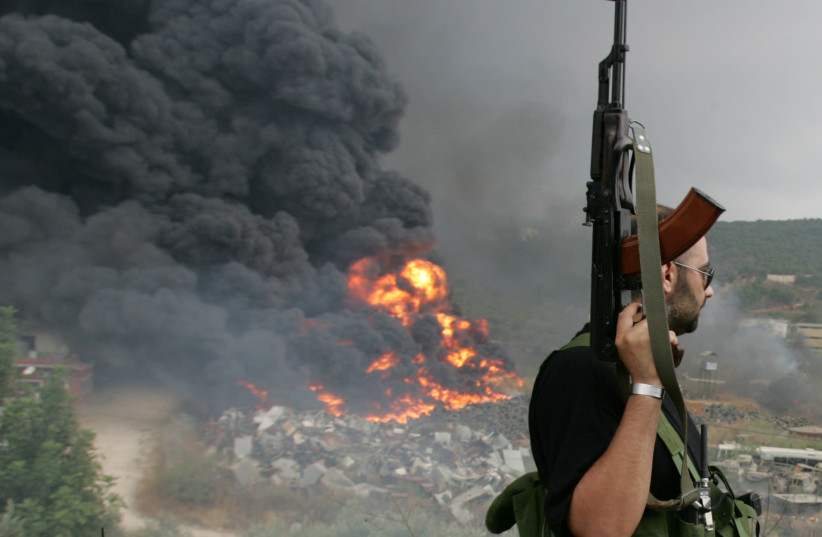If Europe doesn’t act now to save Lebanon from Hezbollah and Iran, there may never be another chance.
RON PROSOR

The tragic explosion at the Beirut Port sent shock waves not just through Lebanon, but through the entire Middle East and everyone who cares about the loss of innocent lives. It should also send a loud siren to the offices of the EU leaders, and if they truly care about the future of Lebanon and its people, they should act now. The most effective, immediate move they can do is to send European forces to monitor the crossings into Lebanon and ensure that any foreign and humanitarian aid arriving in Lebanon would get to those who need it, not Hezbollah.
For the past generation, Hezbollah and Iran have been holding Lebanon hostage. They’ve abused the country’s political system, financial system and resources. With Hezbollah’s military might being stronger than Lebanon’s own army, the Lebanese people were unable to do anything against the terrorist organization and its sponsors – the ayatollahs of Iran.
Now the tables are starting to turn. We, and the Lebanese people, don’t need a 15-year investigation, like the one that looked into former prime minister Rafic al-Hariri’s assassination, to know that Hezbollah’s fingerprints are all over the blast. While Hassan Nasrallah – Hezbollah’s leader – may claim that he knows the Haifa port better than Beirut’s, he can’t deny the terrorist organization’s tendency to hide huge stockpiles of ammonium-nitrate within civilian population centers. They’ve already done it in Beirut’s Dachya Quarter and airport as part of their precision missile program. They were caught red-handed doing it in the UK and Germany – that’s Hezbollah’s modus operandi.
Last week’s tragedy may have been the final straw for the Lebanese people. They are taking to the streets against Hezbollah, in images that are reminiscent of the Arab Spring of a decade ago, and they call on the international community not to give money to Lebanon’s leaders. These voices made it to Paris and other European countries, and Emmanuel Macron, president of France, is calling for a “New Political Order” in Lebanon. For the first time Hezbollah’s leader, Hassan Nasrallah, is hiding not from Israel but rather from the people of Lebanon.
However, it takes time to instill a new political order and Lebanon needs help now. The easiest thing would be to funnel money into the country and help rebuild the damaged buildings and infrastructures. But that would also be the worst thing that the international community can do at this moment.
The international community should send humanitarian aid – food, medicine and clean water to Lebanon immediately. However, supplying the country with building materials, petrol and money must go hand in hand with international control of the borders, that would make sure that Hezbollah isn’t abusing this aid. Failure to do that would be like giving aspirin to a COVID-19 patient. If the international community only deals with the here and now without neutralizing Hezbollah’s stranglehold of the country, not only will it not help Lebanon, it might actually cause more damage in the long run.
The European Union has the ability to make a difference. EUBAM forces (European Union Border Assistance Missions) – which operated between 2007-2015 in the Rafah crossing to Gaza and are still active on the Ukraine-Moldova border – are the model. They try (though not always successfully) to make sure that the crossings don’t become war zones and to prevent smuggling of arms and illegal supplies. A similar force can help give the Lebanese people the aid they need and deserve, while simultaneously weakening Hezbollah’s grip of the country.
European forces are already there. Since 2006, German Navy vessels are patrolling Lebanon’s territorial waters. Believe it or not, they do that at the request of Lebanon’s own government, which asked for this assistance in order to help enforce resolution 1701 after the Second Lebanon War.
All the mechanisms and methods are already there. What is missing is the will and decision to implement them. We should not ask for whom the bell tolls – it tolls loud and clear for the leaders of Europe. If they don’t act now to save Lebanon from Hezbollah and Iran, they may never get another chance.
The writer is chairperson of the Abba Eban Institute of International Diplomacy at IDC Herzliya, former Israeli Ambassador to the UN and the UK.
Content retrieved from: https://www.jpost.com/opinion/its-time-to-listen-to-the-lebanese-people-about-hezbollah-comment-638009?fbclid=IwAR1NF_hdhlQO0Oz-k0vSHErB78tqNFpWKybsFMErdPuS8K8mhktoXDZz8Uc.